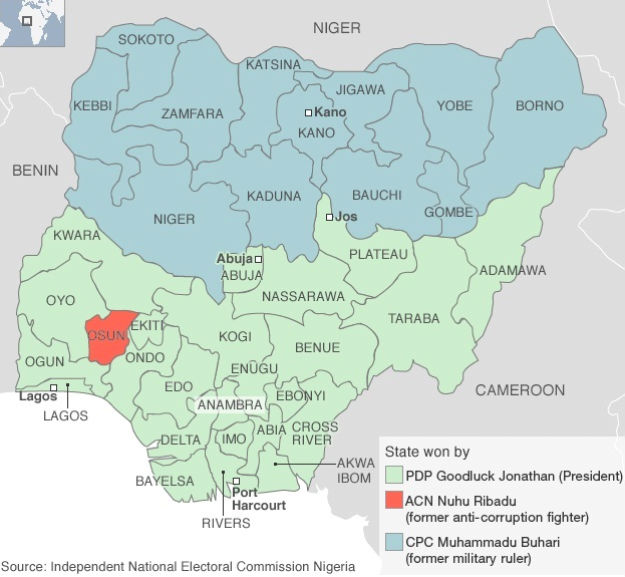Nigeria: "Credible" Elections Reinforce the Divide
More on:

In the aftermath of the presidential elections, Nigeria is dancing closer to the brink. Goodluck Jonathan, the incumbent president and Christian from the South, has defeated Muhammadu Buhari, a Muslim from the North, in an election that the international community has deemed to be credible, albeit far from perfect. In addition, the Independent National Electoral Commission (INEC) and the Nigerian security services have won high marks from international observers and many civil society groups for overseeing the significant improvements in polling (as compared to the events of 2007). The elections also mobilized previously marginalized factions of Nigeria’s populace--including civil organizations, women, and the youth--to participate in Nigerian governance. In some parts of the country, social media also played a positive role for the first time.
However, the final tally of the votes indicates widespread rigging, mostly to the advantage of incumbent president Jonathan. As such, the fraudulent counting predominantly occurred at the collation centers, and it is conceivable that governors belonging to the ruling People’s Democratic party (PDP) orchestrated the rigging. The massive amounts of cash that the PDP disbursed also disfigured the elections. In light of the fraud, the leading opposition candidate, Muhammadu Buhari has flatly rejected the election results, and none of the opposition parties have been willing to endorse the final election figures.
The results of the presidential election show a clear division within the country between the North-South, Muslim-Christian lines, (as can clearly be seen in the BBC map above). In the past, an elite powersharing arrangement, whereby the presidency alternated every eight years between North and South, avoided this bifurcation. Had this arrangement continued, a Muslim president representing the North would have taken occupancy of the presidency for the next four years. Jonathan’s successful candidacy has ended this form of powersharing. Widespread rioting in the North has continued for almost five days, indicating that region does not accept Jonathan’s victory. Traditional rulers in the North who supported Jonathan--notably the Sultan of Sokoto, the Emir of Zaria, and the Emir of Zazzau--are in hiding and their private residences have been torched. Unconfirmed reports are coming out of the North telling of house-to-house searches and murders of PDP supporters. Christian churches have also been burned.
The federal government is using the police (a national institution in Nigeria) and the army to try to curtail the violence and regain control. The violence in the North is almost entirely unreported in the Western media, minus Al Jazeera, WSJ, and CNN correspondents stationed in Abuja and Lagos. The federal government is not releasing statistics. This is wise, as there must be concern about a backlash against Muslim Hausa-Fulani living in predominately Christian parts of the country. There is, for example, an unconfirmed report of the murder of up to two hundred Hausa-Fulani in the predominately Christian part of Kaduna state. (In the polls, the state as a whole went for Buhari.) Nevertheless, it is difficult to judge whether the rioting in the North has become a genuinely popular movement or whether it will burn itself out, as has happened in the past.
Eyes are on the April 26 gubernatorial elections. In the past, they too have often engendered violence as a result of local rivalries. Many are expecting to witness similar chaos this time. The electoral commission says that the elections will take place as scheduled. The fact that some fifteen percent of the House and Senate contests are set to take place on the April 26 puts added pressure on the commission to ensure that the elections go ahead. However, if violence in the North continues, the government might have to postpone them. If they do take place, similar results are likely to reinforce the North-South bifurcation that has so starkly manifested itself in the presidential elections.
To view video on Restoring Nigeria’s zoning, click here.
More on:
 Online Store
Online Store